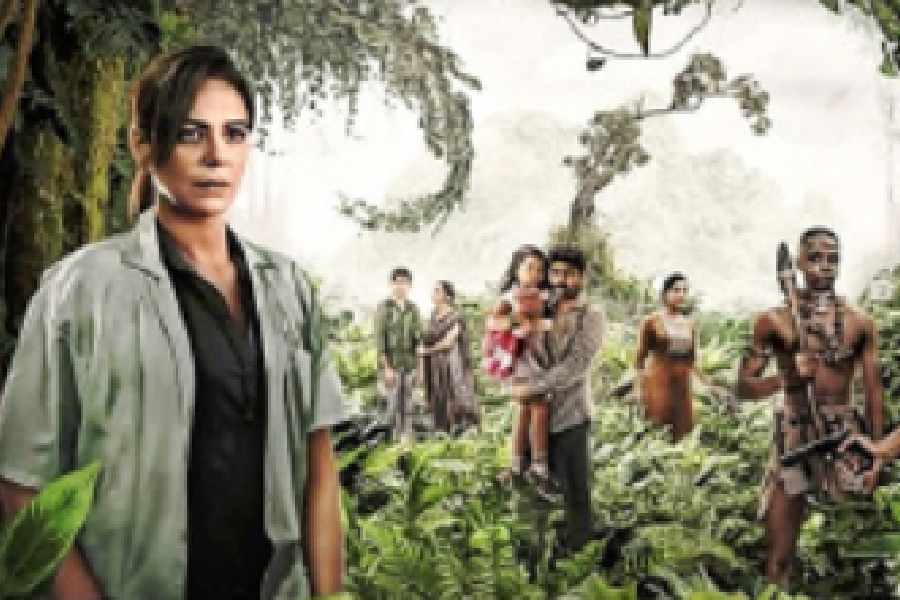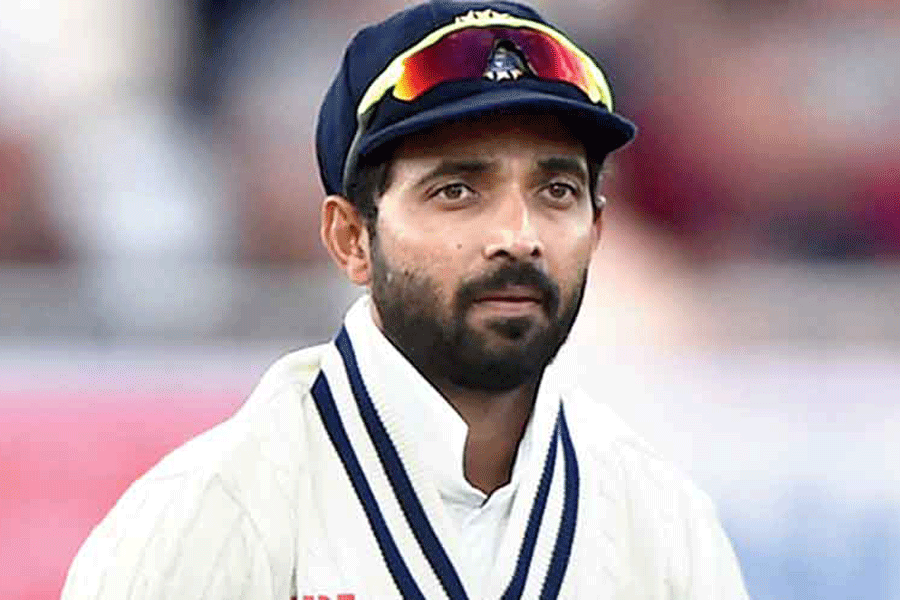Kaala Paani: A Survival Story That Has Taken Netflix By Storm
Creators Sameer Saxena and Tanya Bami Talk About the Show's Success and What to Expect in Season Two

Kaala Paani, that combines human drama and apocalyptic thrill in a moving seven-part series which also talks about ecological preservation and the need to live and let live, has been a winner for Netflix ever since it dropped in mid-October. t2 chatted with the survival show’s creator and co-director Sameer Saxena and Tanya Bami, series head, Netflix India to know more.
Kaala Paani is a very different and well-made series. Both of you must have known that you had a winner but did any aspect of its success and the appreciation that came for it catch you by surprise?
Tanya Bami: I don’t think it’s a show that you expect to see. It’s an unlikely mystery. It’s something that hasn’t been done before. But while it’s not a mainstream idea, the treatment actually makes it connect widely
It’s not the first idea that you would commission as a platform. But we have a lot of faith in Sameer (Saxena), Amit (Golani, co-director) and Bissu (Biswapati Sarkar, writer) and in the way he and Saurabh (Khanna) write and communicate their ideas, the way they build their characters and the deep emotion that always connects, no matter what the story is. So even though it is a differentiated idea, it was really what we were going for, that we wanted something really different. The OTT audience enjoys freshness. But the emotion and the feeling is very familiar, and it’s very grounded.
Sameer Saxena: One of the responses that I am pleasantly surprised with is that people are binge-watching the show. I honestly thought that they will probably take some time, they will take a break after a couple of episodes, but people have sat through the whole season and finished it in one go. That’s heartening to know because it feels like even though there is a lot of drama happening, viewers are connected and invested in the story and the characters and they want to see the whole journey together.
Tanya: It’s been compared to the likes of Sacred Games and that’s really huge. It’s being called the best binge of the year, the best show of the year.
Sameer: The other interesting feedback is that it’s been called a very international show. They say that it’s a very local show, very Indian show, but it has a global appeal.
Tanya: It’s been trending in the global Top 10.
The binge-ability factor of a series is obviously a metre of its success. But there are some makers who don’t want their shows to be watched at one go, they want the viewer to take it in slowly and be invested in it. Which side of the divide are you on?
Sameer: I am happy as long as people are consuming the show, as long as they are finishing the show. Some people get too emotionally moved by certain things and they need a break and some actually just want to go with the flow and experience the whole thing.
Tanya: Biswapati does fabulous narrations. He used to narrate the episodes, mostly virtually. At one point, I think it was episode five or six, life was back to normal after the pandemic and we had to wait for really long to hear the next episode. We then knew that Kaala Paani was a binge experience.
What was the starting point for Kaala Paani?
Sameer: The idea came from Biswapati Sarkar. He had gone to Andaman & Nicobar about 10-15 years ago. While he was touring there, the tourist guide told him that this place is called Kaala Paani because ‘kaal’ means ‘mrityu’. And that line stayed with him. Later, we both travelled to that place separately and when we were exchanging notes, we found it so interesting. That it is such a beautiful place, but if it gets cut off from the mainland, then there is no way to escape it.
And historically, we know that it was called Kaala Paani because no one could escape it. We were very sure that this is something new and fresh. People haven’t seen anything in this space before. We went to Netflix and they immediately approved it. We then started developing the world and the characters. It was an exhausting but fruitful process of one year of writing the show.
This looks like a very difficult project to pull off. What were the challenges of executing it?
Sameer: Yes, it was a humongous effort for all the teams to pull this off. The Andaman & Nicobar islands are beautiful but no one had shot there before on such a scale. We went with a crew of 350 people and shot in jungles, mountains and beaches with minimal equipment. There were cyclones, there were rain interruptions and with such a huge ensemble cast, even a day of not working becomes a lot more challenging.
Having said that, the people of Andaman were very helpful. But because we had no equipment, it was difficult to pull off even the smallest things. We had no (jimmy) jib but the grips and the DoP team used to rig pulleys using trees and hang the camera on it and somehow still get the shot, even without the equipment. Having constraints also tends to make you more creative. While it was all challenging, it was a fantastic experience.
Everyone believed that we had something unique and special and they had the drive to keep pushing themselves to deliver their best. The post (production) was also a very elaborate process. We were on post for about a year — we had to spend time on sound design, BGM (background music) colour grading and editing. Getting the right pace for a show of this kind was very challenging.
Tanya, what about this series leapt out at you?
Tanya: When a story triggers your imagination from a point of relatability and yet has a fantastical leap to it, it’s a really precious story. For me, what was exciting was that fundamentally this is a story of a bunch of six-seven people primarily. We delve into one story per episode beautifully in the middle of what could have been a racy, pacy, three-four episodic thriller. But we chose the drama route intentionally so we could tell the story of a situation through people.
The heart of the story really lies in two things. It is the emotion of the people and the conflict that they are up against — it is human nature vs mother nature. It is such a pertinent story. It is not really about the pandemic. It is actually the story of people dealing with the eventual conflict.
In India, we are not very apocalyptic in our content. That is something we need to pay attention to. Very gently, the series, through its various twists and turns, ups and downs, draws you to the burning question of today... where is the balance? What is the balance and who is responsible? And are we taking that responsibility? What is at the other end of the lack of responsibility? In this season, it is an epidemic. In the next season, it could be something else.
But essentially it is about the balance tipping and it is a story that delivers the message in such a beautiful way. As a viewer, you are so very well-primed to receive the message that it doesn’t feel preachy. You are so deeply moved by everything that you have seen that you actually pay attention to the message, to the story, to the outcome and the takeaway. That stays with you forever and that’s a story well told, according to me.
That’s what drew us. There were just so many lovely, beautiful layers in a distinct idea, distinct narrative style. We had to tell it.
This is a rare show where every character is allowed to develop and have a journey, while you keep the thrill element alive simultaneously. Sameer, what was the key to achieving that balance?
Sameer: It was a lot of brainstorming. We wanted to give justice to each character. We were very clear that even the Orakas should not be another typical tribe that you mostly see on screen. We wanted to treat them as any other character, make them humans, give them flaws, give them their principles, show their living style, give reasons to what they are doing. And that we applied to every single character. We also had the starting and the ending point of every character’s arc figured out. It was the middle that we had to fill up.
Sameer, considering the cliffhanger on which Season One ended, you have left Netflix with no choice but to greenlight a second season. Tanya, when do we get to see Season Two?
Tanya: Yes, Kaala Paani ends on a cliffhanger. I have had my dad call me up and say: ‘You didn’t put one episode.’ I was like: ‘No dad, that is where it ended.’ Many people have said that the story left them at the point where they want to know more. That is the sort of guilty thrill that makers leave you with.
Except for the headline, this story has not been edited by Press Time staff and has been published from a syndicated feed.























































